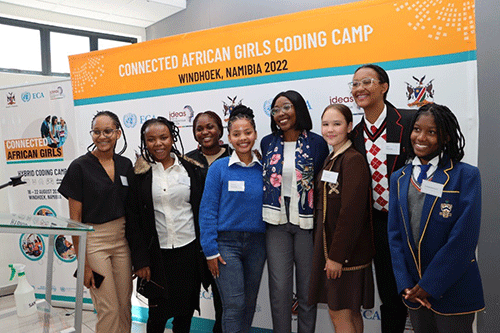Hundreds of girls and young women last week took part in a week-long coding camp, which sought to empower them and close the gender digital divide on the African continent.
Held in Namibia for the first time, the fifth edition of the ‘Connected African Girls Coding Camp’ was commissioned by the United Nations Economic Commission for Africa (ECA) in partnership with the information and communication ministry, UN Namibia, UN WOMEN, the International Telecommunications Union and Telecom Namibia.
This hybrid training saw 100 girls between 12 and 25 years physically in attendance at the Palm Hotel in the capital from 16 to 24 August, and hundreds more online throughout Africa.
The camp’s emphasis was on empowering young females to pursue careers and education in science, technology, engineering, arts and mathematics (STEAM) as well as to participate fully in the African digital economy.
It featured workshops on animation, web development, gaming, Internet of Things (IoT), robotics and 3D printing.
Graphic design was included as a common course in line with artificial intelligence, design thinking and computational thinking.
It also featured master classes on gender-based violence, Sustainable Development Goals of United Nations and Agenda 2063, including personal development skills.
Participant Roux-che Kahirelcie said a few components that stood out for her were artificial intelligence, design thinking and her personal favourite – graphic design.
“All in all, what touched my heart more than my mind is the advice Honourable Emma Theophilus gave us. She reminded us of the importance of having confidence and courage along with growing your network by going out there, reading and carrying our fellow sisters. In conclusion, it was exceptional.”
Ayishah Hipondoka: “I resonated the most with gaming and graphic design. I am an artist and I would like to enrich my artistic skills. I have learned to be confident in my work and not overthink that I am not good enough. One day, I wish to create my own movies. I do also resonate with animation. I draw a lot of cartoons”.
Ndapandula Hango: “A hand full of creativity just enough to make a world on its own. A room for error and another to showcase talent. No one points a finger; you can make an atlas that looks like a shoe. Just endless imagination. Mind you, you need no perfection to be the next hit out there. Try it! As Albert Einstein once said, ‘If you stop learning, you start dying’. So, venture towards it”.
Caren Sue Kahmann: “People are using technology more in this modern age; children must learn to use technology. I use technology for research and playing games. I really want to learn to create my own games”.
Theresia Ndilimeke: “I am obsessed with gaming. I want to gain more skills in how to design games and code. I am here for the skills that I can learn”.
Latoya Bernard: “My younger brother introduced me to coding initially. In grade 10, I realised how important it is in relation to my subjects. I am very interested to learn how to use my subjects in a way that will help me develop new ways of entrepreneurship and help me improve the living standards in rural areas.
Jean-Paul Adam, the ECA director of Technology, Climate Change and Natural resources, said in his speech that coding has become the new literacy, and girls and young Namibian women need to become digitally savvy and active participants in shaping Namibia’s digital future.
“The ECA is always available to support programmes that would help women excel in STEAM fields. Government alone cannot fully address the digital skills deficit. Partnerships and synergies between programmes are essential to close the digital gender gap and tackle barriers and challenges to gender mainstreaming,” he added.
On his part, Peya Mushelenga, information and communication minister, said the government, through the line ministry, is committed to implementing effective legislation that provides easy access to ICT to create a knowledge-based society.
“Over the years, the government has made significant strides to integrate digital technology with the national development objectives,” he said.
– emariahaipinge@gmail.com



